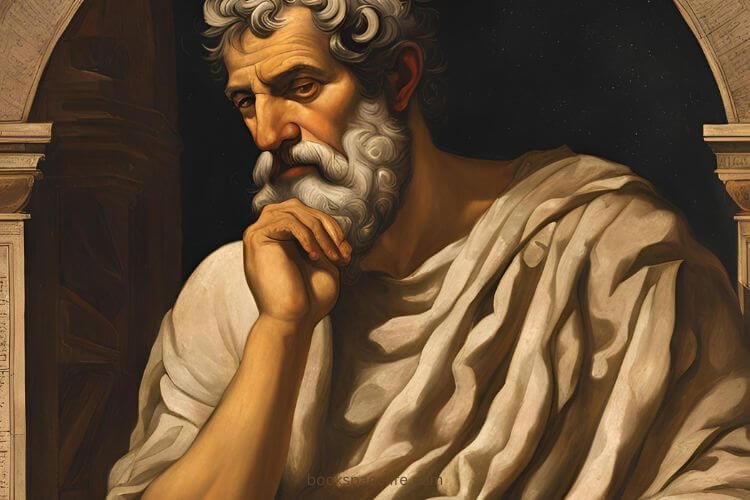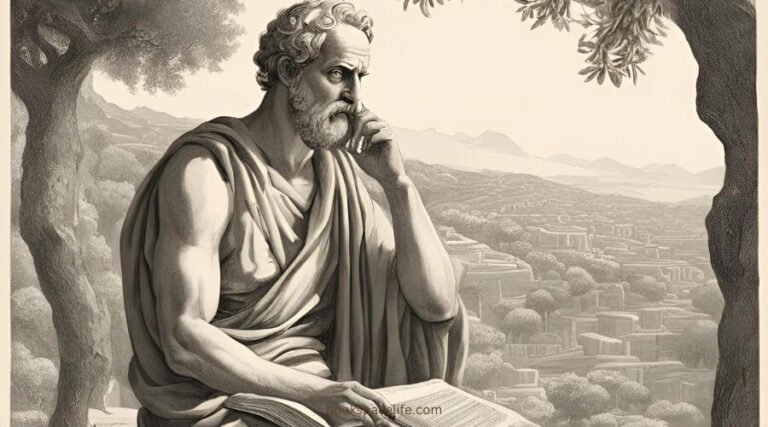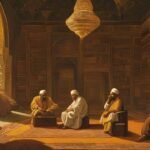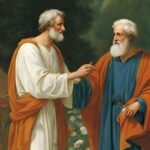Thales of Miletus
Thales of Miletus: The First Philosopher and the Beginnings of Western Thought
Thales of Miletus, a pre-Socratic Greek philosopher from the city of Miletus in Ionia (modern day Turkey), is often regarded as the first philosopher in Western history.
Living in the 6th century BCE, Thales is notable not only for his philosophical inquiries but also for his contributions to science, mathematics, and engineering.
As one of the Seven Sages of Greece, his influence extended beyond philosophy, laying foundational principles for various disciplines.

(1) Life and Historical Context
Thales was born around 624 BCE in the city of Miletus, located on the coast of Ionia in Asia Minor (modern-day Turkey).
Miletus was a bustling center of trade, known for its connections with Egypt, Babylonia, and other Mediterranean civilizations.
This cultural richness likely exposed Thales to a variety of ideas and beliefs from a young age, sparking his intellectual curiosity.
Specific details of his family background are uncertain, but Thales was likely born into a well-connected family, providing him with access to education and allowing him to engage with prominent thinkers and scholars.
Living in Miletus, he was part of an environment that valued inquiry, commerce, and learning, which undoubtedly influenced his philosophical pursuits.
(2) Travels and Intellectual Exposure
Thales is known to have traveled extensively, particularly to Egypt, where he encountered the mathematical and astronomical knowledge of Egyptian scholars.
In Egypt, he studied geometry, a discipline that was advanced in Egyptian society due to its practical applications in fields like architecture, engineering, and land surveying.
Thales is believed to have introduced these geometrical principles to the Greeks, adapting and expanding them for broader philosophical and scientific exploration.
Through his travels, Thales also encountered the Babylonian tradition of astronomy, which had developed over centuries of systematic observation.
This exposure to different intellectual traditions enriched his understanding of mathematics, astronomy, and geometry.
Thales’ travels thus played a crucial role in shaping his views and equipped him with the tools to develop his own theories about the natural world, which later defined the Milesian school of thought.
(3) Early Education and Influence
Thales’ education combined elements of mathematics, astronomy, and practical knowledge from Egypt and Babylon, blended with his Greek heritage.
His approach to education was likely influenced by a desire to explain natural phenomena through reason rather than mythology—a revolutionary departure from the traditional religious interpretations that had been the norm.
Thales’ curiosity about the world, coupled with his exposure to empirical practices, led him to question the mythological explanations of natural events and to look for rational, observable principles instead.
(4) Thales’ Philosophy: Water as the Arche
Thales’ most famous philosophical proposition was that water is the fundamental principle (arche) of all things.
While this might seem simplistic from a modern perspective, his suggestion that a single underlying substance forms the basis of all existence was groundbreaking.
Thales believed that water was the source of life and matter because it could transform into various forms: it could be a solid, liquid, or vapor, demonstrating a flexibility that he saw as emblematic of fundamental matter.
Thales’ proposition marked a significant shift from mythological explanations to natural ones.
In earlier Greek traditions, natural phenomena were seen as the actions of gods, with storms, earthquakes, and other events attributed to divine will.
Thales’ idea that water, a tangible and observable element, could explain the origins and workings of the world represented a new, rational approach to understanding the universe.
Thales’ belief in water as the primary substance inspired later philosophers to search for their own explanations of the arche.
Anaximander, his student, proposed the apeiron (the infinite or boundless) as the ultimate source, while Anaximenes suggested that air was the fundamental element.
Thales’ concept of a single underlying substance ignited a wave of speculation and debate, prompting philosophers to consider alternative substances and principles, thus establishing the foundation for natural philosophy.
(5) Contributions to Mathematics and Astronomy
In addition to his work in philosophy, Thales made notable contributions to mathematics and astronomy.
He is credited with several key insights in geometry, and some ancient sources attribute the following geometric principles to him:
(i) The Thales’ Theorem:
In a right triangle, the angle opposite the hypotenuse is a right angle.
(ii) The Circle Inscription Theorem:
Any angle inscribed in a semicircle is a right angle.
(iii) Basic Geometrical Proofs:
Thales is said to have proved that the base angles of an isosceles triangle are equal and that vertically opposite angles are equal.
These principles may seem fundamental today, but they laid the groundwork for the development of Euclidean geometry.
Thales’ geometric observations demonstrated that one could derive certain truths about the world through logical deduction, setting a precedent for future mathematicians and philosophers.
Thales also contributed to early astronomy. He is said to have accurately predicted a solar eclipse in 585 BCE, a remarkable achievement given the limited astronomical knowledge of the time.
The methods he used remain a mystery, but this prediction established his reputation as a thinker capable of understanding and forecasting cosmic events.
Thales’ interest in astronomy extended to the idea of a rational cosmos, governed by laws that could be understood through observation.
He proposed that celestial bodies, including the stars and planets, were physical objects rather than divine beings, an idea that pushed the boundaries of Greek cosmology.
His influence helped move Greek thought away from mythological interpretations and toward explanations based on observation and reasoning.
(6) Thales’ Influence and Legacy
Thales’ ideas left an indelible mark on the history of philosophy and science, and his legacy extends to some of the most influential figures in Western thought.
As the first philosopher of the Milesian school, he inspired a generation of thinkers, including Anaximander and Anaximenes, to question traditional beliefs and seek natural explanations.
His emphasis on rational inquiry laid the foundation for the philosophical tradition that would later flourish in Athens.
(i) Pythagoras and Mathematics:
Pythagoras, who was influenced by Thales, expanded upon his geometric insights.
Thales’ blending of practical knowledge with theoretical inquiry created a model that Pythagoras would later build upon in developing his own mathematical and philosophical theories.
(ii) Heraclitus and the Concept of Change:
Thales’ notion that a single principle could give rise to the universe likely influenced Heraclitus, who believed that change (embodied by fire) was the fundamental nature of reality.
Thales’ idea of transformation and flux in water paved the way for this later emphasis on change.
(iii) Plato and Aristotle:
Both Plato and Aristotle considered Thales one of the foundational thinkers in Greek philosophy.
Aristotle praised Thales for being the first to seek natural explanations, while Plato saw Thales’ contributions as vital to the development of philosophy.
Aristotle regarded Thales’ ideas as the starting point of metaphysical thought, seeing him as the origin of philosophical inquiries into the nature of being.
(iv) Impact on Science and Natural Philosophy:
Thales’ rational approach and emphasis on observation also influenced the later development of the scientific method.
His insistence that natural phenomena could be understood without invoking the supernatural laid the groundwork for the systematic observation and empirical inquiry that would come to define scientific practice.
(7) The Legacy of Rational Inquiry
Thales’ contribution to the Western intellectual tradition is most evident in his legacy as a rational inquirer.
His willingness to challenge mythological interpretations of the world set the stage for the subsequent evolution of philosophy and science.
While his proposal that water is the arche was later rejected, his approach—seeking underlying principles to explain observable phenomena—has endured.
Thales also represents a broader intellectual shift in ancient Greece, as he was among the first thinkers to propose that the universe operates according to discoverable principles, which can be known through reason.
This approach underlies much of Western thought and continues to inspire philosophers, scientists, and scholars in their pursuit of knowledge.
(8) Conclusion: Thales’ Enduring Significance
Thales of Miletus stands at the origin of Western philosophy, a figure who, through his pioneering thoughts, transformed Greek intellectual culture.
His introduction of natural explanations, his contributions to mathematics and astronomy, and his quest for a unifying principle of the cosmos influenced a wide range of disciplines.
Thales’ legacy endures not only in the principles he introduced but in the spirit of curiosity and inquiry that he inspired.
As the “first philosopher,” Thales showed that the mysteries of the world could be approached through observation, logic, and reasoning rather than solely through myth.
This revolutionary mindset has shaped not only philosophy but also the scientific method, making Thales a true founding figure in Western intellectual history.
Through his life and works, Thales reminds us of the power of questioning, of seeking rational explanations, and of the infinite potential of human understanding.
(1) 7 Quick Facts on Thales of Miletus
- Birth – Thales was born around 624 BCE in Miletus, an ancient Greek city in Ionia (modern day Turkey).
- Early Education in Egypt – He studied mathematics and engineering during his travels to Egypt.
- Learned Geometry from Egyptians – Thales applied Egyptian geometry to solve Greek architectural and land-measuring problems.
- Predicted Solar Eclipse – He accurately predicted a solar eclipse in 585 BCE.
- Water as Primary Substance – Thales proposed water as the fundamental substance of all matter.
- Founded Milesian School – He established the Milesian school, focusing on natural philosophy.
- Studied Celestial Movements – Thales analyzed stars and constellations, contributing to early Greek astronomy.
(2) 10 Quotes attributed to Thales
- Everything is full of gods – Suggesting that the divine is present in all things.
- Water is the principle of all things – His belief in water as the fundamental substance of the universe.
- A thing is not necessarily true because a man dies for it – A statement about the nature of truth and conviction.
- The most difficult thing in life is to know yourself – Emphasizing the importance of self-awareness and understanding.
- Time is the wisest counselor of all – A reflection on the insights gained through experience over time.
- The stars are not for the heavens but for the Earth – Suggesting the importance of earthly existence over celestial concerns.
- Hope is the only good that is common to all men – Highlighting the universal nature of hope as a human trait.
- What is difficult is to see the things that are before your eyes – A statement on perception and awareness.
- To be an optimist is to be a fool – A critical view on blind optimism.
- The greatest difficulty is to know ourselves – Reinforcing the idea of self-knowledge as a challenge.











